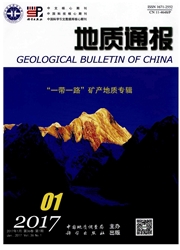

 中文摘要:
中文摘要:
地表调查表明,沿青藏铁路唐古拉山-拉萨段存在5条重要的全新世控震断裂带,从北到南分别是温泉盆地西缘断裂带、安多盆地北缘断裂带、崩错断裂带、谷露西缘断裂带和当雄-羊八井断裂带。构造-地貌和年代学分析结果表明,北部的温泉盆地西缘断裂和安多盆地北缘断裂带的活动强度相对比较小,平均垂直活动速率约为0.2-0.5mm/a。南侧的谷露西缘断裂带和当雄一羊八井断裂带的全新世垂直活动速率为约(1.5±0.5)mm/a。而中部的崩错走滑断裂带的活动强度最大,晚第四纪期间的走滑速率可迭(11±4.5)mm/a。全新世断裂活动和古地震研究表明,其中温泉盆地西缘断裂带、安多盆地北缘断裂带、崩错断裂带的西北分支、当雄-羊八井断裂带的当雄段等区域未来发生强震的概率相对更大。
 英文摘要:
英文摘要:
Surface investigation shows that there are five major Holocene seismogenic fault zones along the Tanggula-Lhasa section of the Qinghai-Tibet Kailway in the central Tibetan Plateau; from north to south they are the western Wenquan basin marginal fault zone, northern Amdo basin marginal fault zone, Bong Co fault zone, western Golug basin marginal fault zone and Damxung-Yangbajain fault zone. The tectono-geomorphological and chronological analyses indicate that: the western Wenquan marginal fault and northern Amdo basin marginal fault zone in the north are less active, with an average rate of vertical movement of 0.2-0.5 mm/a; the rates of Holocene vertical movements of the western Golug basin marginal fault zone and Damxung-Yangbajain fault zone on the south were -1.5+0.5 mm/a; and the Bong Co strike-slip fault zone in the central part was most active with an average strike-slip rate of 11+4.5 mm/a during the Late Quaternary. The average vertical slip rate is 1-2mm/a along the normal fault. Based on paleo-seismic evidences, Three paleo-earthquakes (Ms.7 to 8) occurred in approximately 7.4±0.7 ka BP, 4.5±0.3 ka BP and 2.3±0.2 ka BP are identified, and suggest the recurrence interval of Ms.7-8 earthquake is 2300±700a since 8ka BP and at least 1700±200a since 5ka BP along north-margin fault zone of Damxung-Yangbajain basin. There is a higher probability of occurrence of strong earthquakes in the future in the western Wenquan basin marginal fault zone, northern Amdo basin marginal fault zone, northwestern branch of the Bong Co fault zone and Damxung segment of the Damxung-Yanghajain fault zone.
 同期刊论文项目
同期刊论文项目
 同项目期刊论文
同项目期刊论文
 期刊信息
期刊信息
